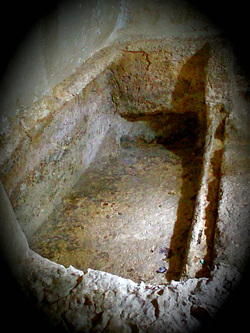"He is not here, for he has risen..."
He was given a charge from His Father; and as the perfect Son He obeyed it completely both to lay down His life and also take it back up again (Jn. 10:17-18). This He did, so that He would lose nothing that the Father has given Him (Jn. 6:39) and that all those who look on the Son and believe in Him should have eternal life (Jn. 6:40). Praise God that "He is not here [in the tomb], for he has risen..." (Mt. 28:6)! He has risen indeed! But how did Jesus get in the tomb in the first place? From the divine perspective He was delivered up for our trespasses (Rom. 4:25).(1) But from the human perspective He was betrayed by one of his friends (Ps. 41:9; Jn. 13:18). We all know well exactly how that betrayal was accomplished too. With a kiss. It's certainly natural for us at first to imagine the irony of this in that a kiss is generally a sign of love or affection. That in itself would be cruel enough to use as a testimony of betrayal. But there is something far more involved in what the betrayer Judas was doing that night. Jesus, by all accounts, was the rightful King of Israel (Mt. 1:1), indeed of the whole world (Ps. 22:28). Though when asked by Pilate, "Shall I crucify your King?", the leaders of Israel replied, "We have no king but Caesar" (Jn. 19:15). Jesus nonetheless Himself testified to the truth, that He and He alone was the true King, as He spoke of Himself as having a kingdom (Jn. 18:36).(2) But let's look back for just a second to see how God's people showed their recognition of His installed King. At the anointing of Israel's first king, Saul, we get a picture of what this looks like: Then Samuel took a flask of oil and poured it on his head and kissed him... A kiss. This became a precedent of the gesture used to signify one's submission to the King. David later writes about this in his prophetic Psalm concerning Christ's rule over all the nations. He says we all are to "Kiss the Son" (Ps. 2:12), a symbol and testimony of our bowing the knee to the one true King of kings and Lord of lords (Rev. 19:16). We all are to kiss the Son and bow down to Him as our Lord and Savior and King. But Satan working in Judas used that very gesture as a betrayal of the Son (Mt. 26:48). Does it not give us more to ponder in considering Jesus' interaction with his betrayer, "Judas, would you betray the Son of Man with a kiss?" (Lk. 22:48)? The very thing that we are to do as a sign of our submission to the Lordship of Christ was the very thing used to betray Him to His death. But, O, the mercies of God! Truly Satan, in all his mockery by coming into Judas (Jn. 13:27) and using him as an instrument of betrayal - he does not have the last laugh. But Jesus does (Ps. 2:4). Christ is risen from the dead! And there is another irony here. The cross was indeed a sign of God's curse (Gal. 3:13), but for us who believe, Christ has turned it into a sign of our hope, redemption, and joy - and indeed the only thing in the world in which we can boast (Gal. 6:14). Having gone to the cross he paid for all our sins (Col. 2:13-14), and having risen from the dead He has forever secured our eternal life (Rom. 4:24-25; 1 Pet. 1:3-5). While Satan used a symbol of submission as a sign of betrayal, Christ used a symbol of cursing as a sign of redemption! Oh, the depth of the riches and wisdom and knowledge of God! How unsearchable are his judgments and how inscrutable his ways! He is risen! Hallelujah! (1) Because we were sinners in need of a Savior, Christ willingly bore the payment in full of all who believe in Him (Jn. 3:16; 1 Jn. 2:1-2). And He rose from the dead ensuring our victory from the snare of death (1 Cor. 15:56-57). (2) It's interesting to note here two things: (1) one of the references Jesus uses most concerning himself is the phrase "son of man," and (2) His kingdom is an everlasting kingdom that shall not be destroyed. And both are given explicit reference in the same passage of Scripture (Dan. 7:13-14).
|
Categories
All
|
